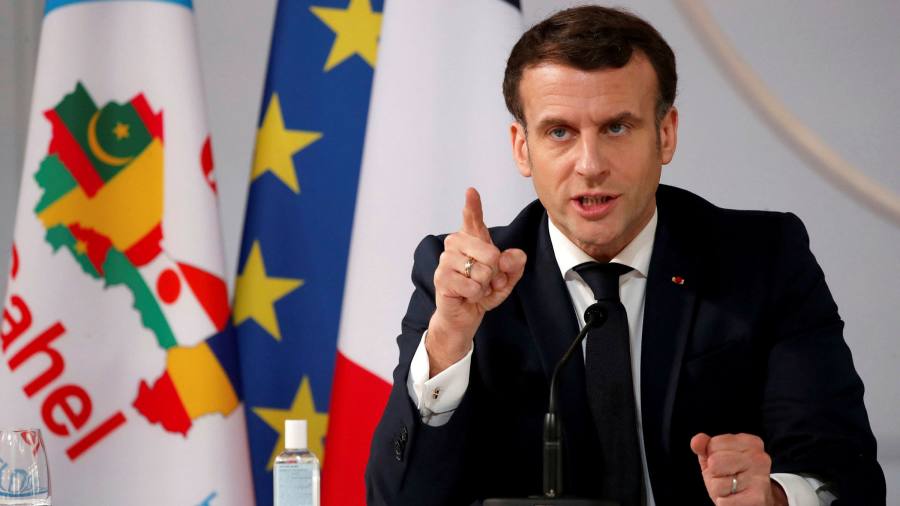[ad_1]
Emmanuel Macron has decided against an immediate reduction of France’s 5,100-stong military force fighting Islamist militants in the Sahel region of west Africa, but has confirmed that the long-term goal is to cut back Operation Barkhane to avoid “infinite warâ€.
“Rushing through a French withdrawal of forces, a massive drawdown of troops, which is one of the scenarios I studied, would be an error,†the French president told a news conference after attending by videoconference a summit of Sahel states and their allies in the Chadian capital N’Djamena. “In the coming months, we won’t change our presence.â€
Macron, confronted by an erosion of public support in France for its largest military operation abroad, had been expected to begin withdrawing hundreds of French soldiers from the operation. This follows the addition of 600 a year ago to help stabilise Mali and its neighbours in the face of frequent attacks by jihadis and allied ethnic groups.Â
The president nevertheless said that after the summer he envisaged winding down the French operation with its big military bases in favour of a lighter, more mobile presence together with an enhanced multinational special forces contingent of 2,000 called Takuba.
“We won’t do it right away, but I think it makes sense,†he said. “Our aim is not to fight against all the groups that might exist in the region — it would be infinite war. Our aim is to fight against identified terrorist groups who threaten the stability of the region’s sovereign states and the security of its populations.â€
After eight years of French military intervention in the Sahel, Macron has called for a “civil surge†by African governments to back up what he says are the recent successes of the “military surge†against militants in the so-called tri-border area of semi-desert linking Mali, Burkina Faso and Niger. That civil effort meant reopening schools and reinstalling local government in areas previously abandoned to the jihadis.Â
“All the military efforts you like don’t work without dialogue to reintegrate rebel groups,†the French president said, offering support for Sahel governments’ efforts to negotiate with rebel groups.
France rejects negotiations with Islamist groups it sees as an irredentist threat to Europe, including Islamic State of the Greater Sahara, but Macron said he supported talks with local ethnic militias provided they laid down their weapons and disassociated themselves from terrorist groups that sometimes exploited them.
“France doesn’t fight all insurrectionist groups, some of them have ethnic or political agendas,†Macron said. “We fight only terrorist groups.â€Â
French forces in the Sahel rely heavily on US intelligence capabilities and are supported by British helicopters, but Paris has struggled to secure wholehearted military or financial support from most of its EU allies for the fighting.Â
In a rare public statement, Bernard Emié, head of France’s foreign intelligence service the DGSE, said at the start of February that terrorists in Mali were considering attacks in Europe, as well as expanding their operations south from the Sahel to nations such as Guinea and Ivory CoastÂ
In spite of the threat of terrorist attacks on French soil originating in Africa, initially enthusiastic French public support for military operations in Mali has declined in recent years. There have been no attacks in France linked to Sahel terror groups. An Ifop poll for Le Point magazine last month found that for the first time a narrow majority — by 51 per cent to 49 — viewed the war unfavourably.
[ad_2]
Source link







